Author: abermeo
A CRISIS-PROOF TEAM MARISCAL SUCRE INTERNATIONAL AIRPORT QUITO’S AIRPORT IS THE MAIN ENTRYWAY TO THE COUNTRY. GATEWAY TO ECUADOR LEADS THE OPERATION OF THE QUITO AIRPORT
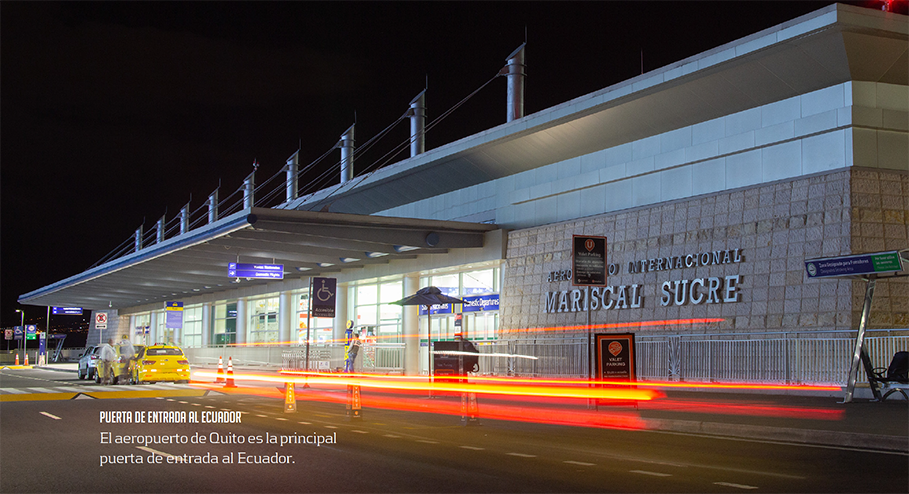
- In the midst of the global crisis caused by the outbreak of the COVID-19, Quito airport keeps its operations running to receive and dispatch flights that, in a world with reduced connectivity, can prove to be essential.
Q uito International Airport is a strategic site for the city and the country; it is the main entry and exit door by air and therefore, since the crisis caused by the Covid-19 pandemic began, the operation of the airport and the controls that the health and immigration authorities carry out have been key in the efforts that Ecuador does to contain the disease.
Andrew O’Brian, President and CEO of Corporación Quiport, the company in charge of the operation and management of the Quito International Airport, explained that “since the beginning of the situation, in mid-January, we have maintained permanent coordination at the highest level with the Ministry of Government, the Ministry of Transport and Public Works, the Ministry of Health, the General Directorate of Civil Aviation, the Municipality of Quito, the Metropolitan Public Company of Airport Services (EPMSA), the airlines that operate in Quito and our commercial operators to guarantee that the measures applied at the city’s airport meet the control objectives while at the same time the international regulations established by the International Civil Aviation Organization (ICAO)”.
Since the first days of this sanitary crisis, the presence of the Ecuadorian Ministry of Public Health has been permanent, applying the necessary prevention and control protocols in
accordance with the alert stages that the World Health Organization has been announcing.
The work carried out at Ecuador’s main airport has not been a simple task. By Government decree, national passenger flights are suspended, as well as the arrival of passengers on international flights. Although air operations have been limited to only cargo flights and a few international passenger departure flights, sanctioned by the Ecuadorian State, the circumstances require increased efforts, especially to manage the operation of export cargo, essential to keep alive the production of flowers, the main export product by air in the country.
Quiport administrative personnel, as well as practically all the dependencies of public and private entities that operate in the airport, are working remotely under home-office measures, while complying with social distancing imposed by the Government. On the other hand, the operations personnel necessary to keep airport open is presently at the bare minimum. Of course, all staff must use personal protective equipmetn such as masks and gloves, and also follow the recommendations to keep a distance of at least one meter from other people, constantly wash their hands and continually use hand sanitizer or alcohol.
“We have a great responsibility to keep operations open, but even greater is our responsibility to the people who work at the airport and to the travelers,” emphasizes Andrew O’Brian. Therefore, another of the preventive measures adopted by Quiport to avoid Covid-19 infections at the airport is the disinfection of the passenger terminal. For this, a broad spectrum virucidal is used, employed in hospitals. The product is applied consistently in all areas through which airport passengers transit.
Communication is another factor that the airport operator has not neglected. In these situations, the natural fear of a pandemic is fueled by disinformation and, aware of this threat, Quiport leadership organized three fronts of communication: internal to company employees, external to companies and institutions that provide service at the airport, which is known as the airport community, and finally public, aimed at the media and public opinion in general.
For Andrew O’Brian, showing leadership has been essential. “Keeping all of our stakeholders informed gave us the necessary space to be able to act calmly, make the appropriate decisions at every juncture and work collectively, while listening to the points of view, concerns and needs of all those who we are involved in the operation of the airport”.
As such, from the moment the Government declared a state of emergency due to the Covid-19 pandemic, Quiport has been acting as a valid mediator between the authorities, on the one hand, and airlines and commercial operators, on the other, to find points of agreement that allow efficiently implement flight restriction measures necessary to control the spread of the disease and prevent people who could be infected with the virus from entering the country.
In this manner, several work sessions have been held, led by the Mayor of Quito, Jorge Yunda, the General Director of Civil Aviation, Anyelo Acosta, Pablo Galindo, Undersecretary of Civil Aeronautical Transport, among other authorities, together with the managers of Quiport and airline representatives to cover all concerns and requirements.
At the same time, a coordination mechanism was also created with the embassies of various countries to establish information channels to provide support to their citizens, while in Ecuador.
Taking advantage of lessons learned from previous situations – such as the social protests that paralyzed the country for 10 days in October 2019 – mechanisms are implemented to regulate the entry of passengers to the terminal and the administrative building, located in front of the terminal. An area has been fitted to accomodate passengers who must stay overnight at the airport while waiting for their flight abroad. We are deeply concerned for our users; Quiport serves snacks and hot drinks to dozens of passengers who spend the night waiting for their flight to make the hours of stay a little more bearable.
Behind all this is, according to Andrew O’Brian, a team of highly committed and highly professional workers. “The most resilient companies are those that can face crises and overcome them to move forward. Resilience is something we have acquired over the years, facing together many complex situations that have occured in the airport industry and others product of the social and economic environment in which our operation is run. The team knows that together we will prevail and we will emerge stronger from this situation.”
But it is also essential to have the support of the authorities. EPMSA is the municipal entity that acts as Quiport’s counterpart in the Public-Private Alliance for airport management. “The excellent relationship we have with the General Manager of the EPMSA, Sandro Ruiz, allows us to maintain a direct channel at the highest municipal level to ensure total alignment, essential to develop proactive management; Sandro Ruiz fully understands our role, allows us to act and intervenes in a timely manner when circumstances demand it.”
And at the end a look to the future. “We hope that this situation ends soon and we are aware that the negative effects will be felt for months. We, the nine thousand people and more than 100 entities that work at the airport, are ready to recommence our activities with resolve and resume our role as one of the main economic engines of Quito and Ecuador.”
CARGO OPERATIONS HAVE NOT STOPPED
A total 69 cargo flights have left the Quito International Airport between the 18th and 29th of March, transporting 2,500 metric tons of export cargo to the world.
Restrictions imposed on air transport do not affect international cargo flights, however, due to the global health emergency caused by the Coronavirus pandemic, international markets have decreased their demand. Similarly, cargo imports continue to develop to supply the country with the products and supplies necessary for various activities.
“Keeping the cargo operations open allows the country’s producing sector active, specifically the one related to flower production. The airport is the main point of entry and exit of goods for Quito and its area of influence, therefore, it is essential to continue with the cargo operation, fulfilling the commitment made to the Mayor of Quito, Jorge Yunda, to continue supporting the productive activities of the city,” says Andrew O’Brian, President and CEO of Corporación Quiport.
The entire air cargo logistics chain is still operational, starting in Tabacarcen, a logistics center that houses 70% of the air cargo consolidation, as well as the four palletizers that work in the export cargo terminal: Novacargo, Pertrally, Aerosan and Servipalet . Cargo airlines continue to arrive at the airport, although some flights were suspended due to lower demand.
All the actors in the logistics chain have taken all the necessary protection measures to prevent infection among their collaborators, equipping them with the necessary personal protection equipment, and at the same time continuing with their daily operations.
“It is a difficult time for everyone, however, we have a great responsibility to the country. All of us involved in the activity of air cargo transportation are very well aware of this fact. We are very grateful for the commitment, will and effort of the companies involved and their work teams, who are allowing us not to stop,” concludes Andrew O’Brian.
CARGO OPERATIONS ARE KEY TO KEEP THE PRODUCTIVE SECTOR RUNNING AND TO IMPORT MEDICINES AND MEDICAL SUPPLIES
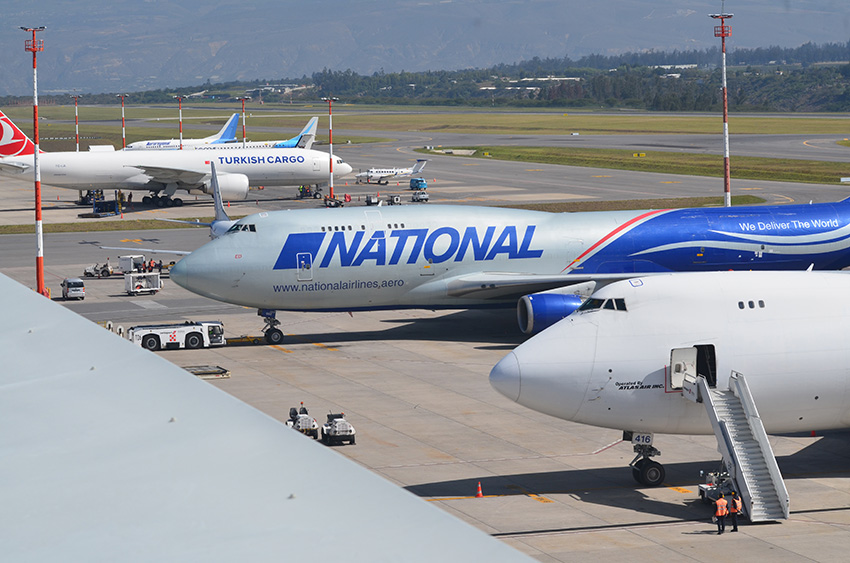
A total 69 cargo flights have left the Quito International Airport between the 18th and 29th of March, transporting 2,500 metric tons of export cargo to the world. Restrictions imposed on air transport do not affect international cargo flights, however, due to the global health emergency caused by the Coronavirus pandemic, international markets have decreased their demand. Similarly, cargo imports continue to develop to supply the country with the products and supplies necessary for various activities.
“Keeping the cargo operations open allows the country’s producing sector active, specifically the one related to flower production. The airport is the main point of entry and exit of goods for Quito and its area of influence, therefore, it is essential to continue with the cargo operation, fulfilling the commitment made to the Mayor of Quito, Jorge Yunda, to continue supporting the productive activities of the city,” says Andrew O’Brian, President and CEO of Corporación Quiport.
The entire air cargo logistics chain is still operational, starting in Tabacarcen, a logistics center that houses 70% of the air cargo consolidation, as well as the four palletizers that work in the export cargo terminal: Novacargo, Pertrally, Aerosan and Servipalet . Cargo airlines continue to arrive at the airport, although some flights were suspended due to lower demand.
All the actors in the logistics chain have taken all the necessary protection measures to prevent infection among their collaborators, equipping them with the necessary personal protection equipment, and at the same time continuing with their daily operations.
Santiago Gómez de la Torre, General Manager of Tabacarcen, explains that air transport fulfills a role that in many cases can be vital. “International cargo flights mainly transport medicines and medical supplies, protective equipment, industrial products, as well as household items,” he reports.
Regarding the consolidation of export cargo, many flower orders have been canceled, which directly affects the consolidators, but even so trucks continue to deliver flowers at the international cargo terminal for export, although not in a reduced quantity. This causes the facilities to be working at a third of their capacity.
Meanwhile, Eduardo Emanuele, General Manager of Pertrally, one of the four palletizers that operate in the cargo terminal of the Quito airport, considers that “all of us actors are making great coordinated efforts to maintain the export activity.”
“With Quiport’s leadership, we have all pitched in, although the impact is serious. We estimate a reduction of 35% of what we normally transport. Around these dates we’d normally be bustling with activity as part of the high season for Mother’s Day, which, under present circumstances, will not occur this year as it has in previous years,” said Eduardo Emanuele, who calls for continued efforts to achieve the success of the export operation that is an essential part of the country’s economy.
Elizabeth Suárez, General Manager of PrimeAir, a representative of two cargo airlines operating in Quito, explains that, despite the drop in demand – mainly due to the fall in the European market – Middle Eastern, Asian, Australian and Russian markets mantain a semblance of normalcy. Meanwhile, in the United States, the drop in demand has began to be felt during the past week.
“The importance of keeping air cargo operations active is fundamental since we are not only involved with the movement of flowers and fruit, which by the way is an industry that has been hit hard by this crisis and must be fully supported, but also in the transport medicines and medical supplies that can help us be best prepared for this situation. Furthermore, it allows us to maintain important connectivity between Ecuador and the world,” remarked Elizabeth Suárez.
“It is a difficult time for everyone, however, we have a great responsibility to the country. All of us involved in the activity of air cargo transportation are very well aware of this fact. We are very grateful for the commitment, will and effort of the companies involved and their work teams, who are allowing us not to stop,” concludes Andrew O’Brian.
QUITO INTERNATIONAL AIRPORT WILL PROVIDE THE FACILITIES REQUIRED BY THE STATE FOR THE REPATRIATION PROTOCOL
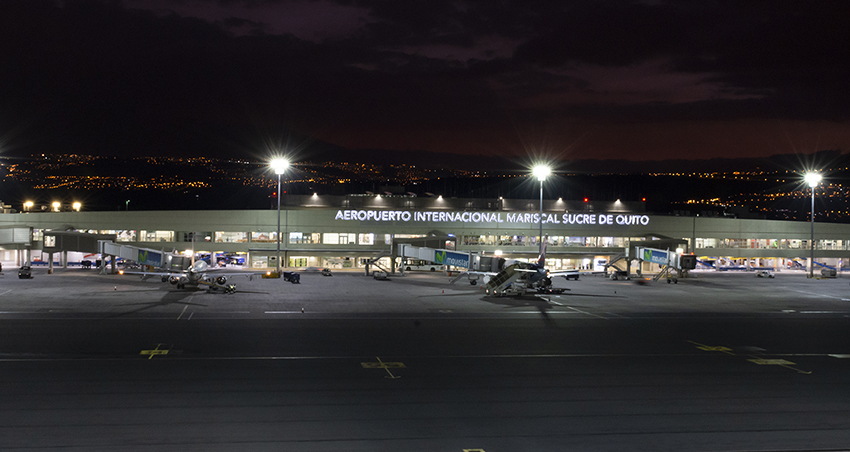
The National Government has approved a protocol for the repatriation for minors who are overseas without their parents, pregnant women, people with disabilities and the elderly. The document establishes specific responsibilities for the various government entities that have jurisdiction in this situation, such as the Ministry of Foreign Affairs, the Ministry of Public Health, the Ministry of Government and the General Directorate of Civil Aviation.
Yesterday, March 24, the Municipality of Quito also approved this protocol, making it clear that the aforementioned government entities must guarantee compliance with all sanitary control and security measures when these passengers enter the country in the event of use Quito International Airport as an entry point. Corporación Quiport, as it has been doing, is ready to work with the Government and will provide all the facilities so that State entities can fulfill their responsibilities under this protocol.
QUITO AIRPORT KEEPS ITS OPERATIONS OPEN AND MANAGES HUMANITARIAN FLIGHTS
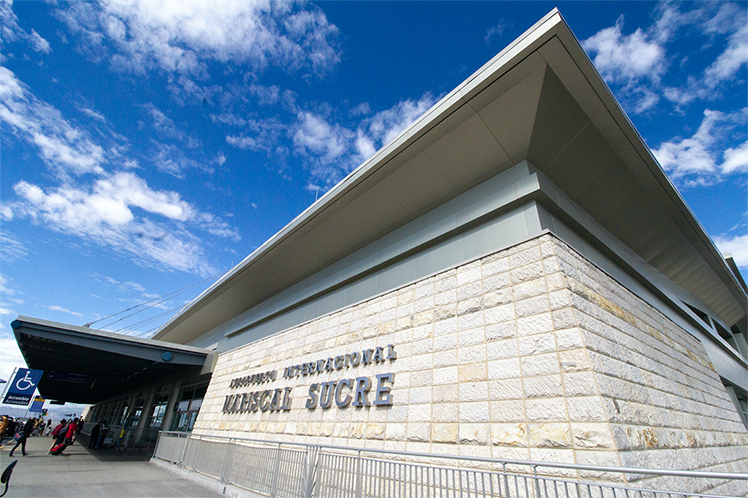
Operations at the Mariscal Sucre International Airport in Quito remain open, with the restrictions established by the Government of Ecuador and the Municipality of Quito to stop the spread of Covid-19. Humanitarian flights to repatriate foreigners from Ecuador to Europe are being carried out normally from the Quito airport.
Corporación Quiport, the company in charge of the operation and management of the Quito International Airport, are working at the highest level with the Ministry of Government, the Ministry of Transport and Public Works, the Ministry of Health, the General Directorate of Civil Aviation, the Municipality of Quito and the Metropolitan Public Company of Airport Services to guarantee the operation of humanitarian flights and that the measures applied at the Quito airport comply with international regulations.
Operations at Quito airport are carried out in compliance with governmental and municipal regulations, framed in international regulations:
- The arrival of international passengers, whether foreign or Ecuadorian, is suspended.
- International departure flights are authorized. Some airlines are making international departure flights from Ecuador for which they bring empty planes – a ferry operation – which will then depart with their passengers from the Quito airport.
- Domestic flights are suspended throughout the country. The General Directorate of Civil Aviation, in coordination with the Municipality of Quito, may, in an exceptional manner, authorize national flights for justified situations.
- International cargo flights are authorized.
- Military or air ambulance flights are authorized.
- The application of these measures is valid until April 5.
Corporación Quiport has been carrying out a disinfection process of the entire passenger terminal, that is, national and international arrivals and departures areas, as well as public halls. For this effect, we are using a broad spectrum virucidal that allows immediate disinfection.
We recommend foreign citizens who wish to leave the country by air to consult with the airlines that operate in the city about the travel options they offer, or to contact the embassies of their countries, who can guide and provide support.
Andrew O’Brian
President and CEO
14 INTERNATIONAL FLIGHTS HAVE DEPARTED FROM THE QUITO AIRPORT UNTIL SUNDAY, MARCH 22
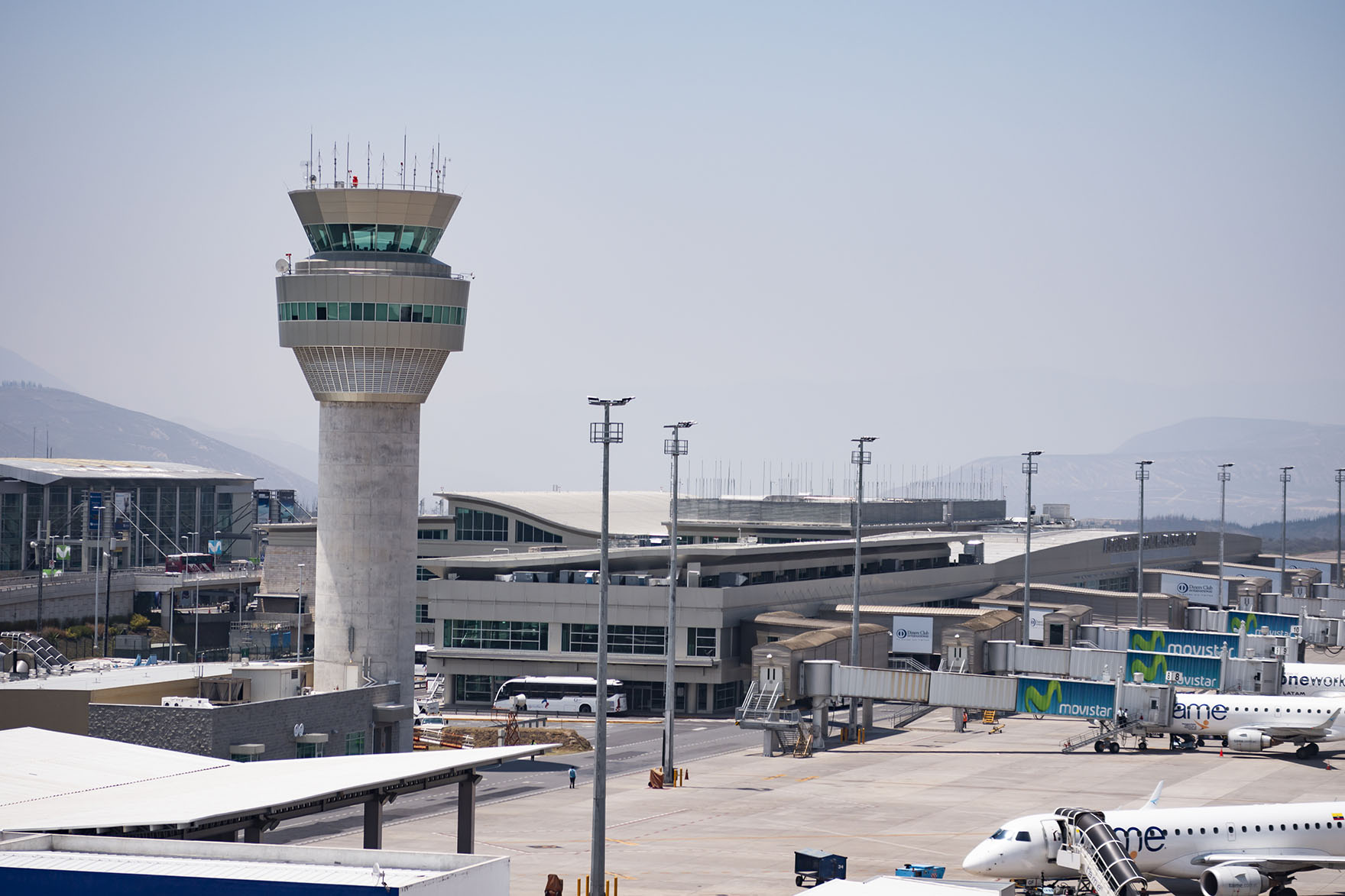
As of Tuesday, March 17 to Sunday, March 22, a total of 14 humanitarian flights carrying passengers abroad will have departed from the Quito International Airport, allowing the repatriation of nearly three thousand people, most of them European citizens or residents.
Including this evening’s airlifts, KLM will have carried out 4 humanitarian flights (to Amsterdam); Air France: 3 (Paris); Iberia: 2 (Madrid); Avianca: 2 (Bogota); Copa: 1 (Panama City); Aeroregional: 1 (Toluca, Mexico) and Tame: 1 (Fort Lauderdale, United States). A second flight from Tame is scheduled to depart for Fort Lauderdale in the early hours of Monday, March 23.
Passenger operations are interrupted, with the exception of international passenger departure flights that are permitted for humanitarian reasons such as repatriation. These aircraft arrive at the Quito airport empty, which is known in the industry as a “ferry operation”, they board passengers at the airport terminal and leave the city. It is important to remember that Air cargo operations are allowed.
Andrew O’Brian, President and CEO of Quiport, explained that it is vitally important to keep the airport open and allow humanitarian flights. “There are people at the airport working diligently so that foreigners who need to travel to their countries can do so. We are taking all security measures for everyone who is working at the airport. I am deeply grateful for everyone’s work, because they are doing it in good spirits, understanding that there is a very powerful human factor behind: allowing foreigners in Ecuador to get back home.”
Airline crews that, in compliance with international regulations on the maximum time that they can pilot an aircraft, must stay overnight in the country to rest, the Ecuadorian General Directorate of Civil Aviation issued a security protocol that is observed and complied with by all the airmen. The protocol includes medical checks and measures of social distancing.
Due to the drastic decrease in flights, some 50 people from the airlines that operate humanitarian flights currently work in the passenger terminal, plus aviation security in charge of the Metropolitan Public Company of Airport Services, Migration, General Directorate of Civil Aviation, private security, cleaning and Quiport Operations personnel. All the people who must continue working in the passenger terminal have the appropriate protections such as masks, gloves and hand sanitizer available at all times.
QUITO AIRPORT OPERATES WITHIN GOVERNMENTAL AND MUNICIPAL PROVISIONS
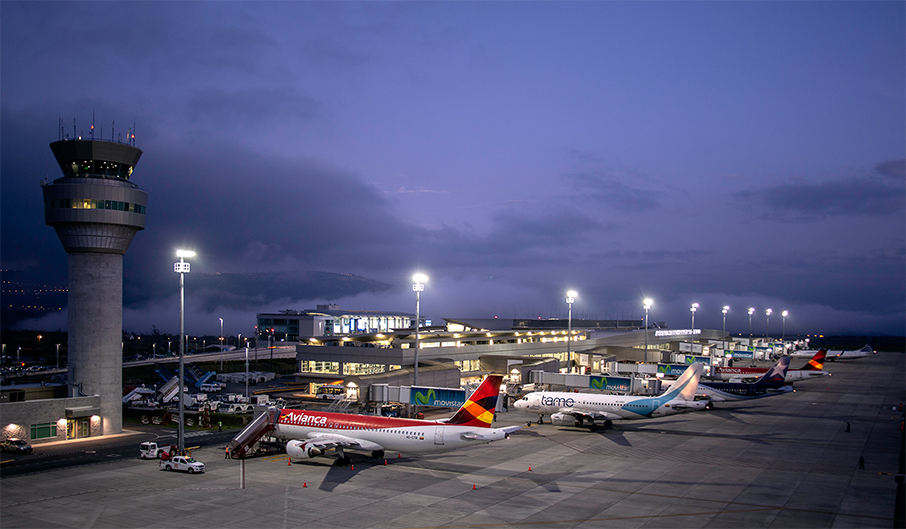
The Municipality of the Metropolitan District of Quito, using its powers to oversee the city’s airport service and in accordance with the decrees of the National Government, confirmed that international arrivals at the Mariscal Sucre International Airport of flights with passengers whose final or intermediate destination is the city of Quito will not be allowed.
The city authority also emphasizes that international cargo flights, aircraft that arrive without passengers to Quito to carry passengers abroad, as well as military and air ambulance flights, contemplated in Ministerial Agreement 003 of the Ministry of Transportation and Public Works, will be permitted to operate.
Corporación Quiport, the concessionaire in charge of the administration and operation of Quito’s airport, reiterates its predisposition to abide by all state, national and local guidelines, framed in the law and in the powers of each establishment.
According to the Municipality, these are policies that focus on favoring the wellbeing of the general population.
We ask citizens to follow health recommendations, avoid listening to and replicating rumors and false information, and to report through official channels.
QUITO INTERNATIONAL AIRPORT IMPLEMENTS A SUCCESSFUL ROUTE DEVELOPMENT STRATEGY
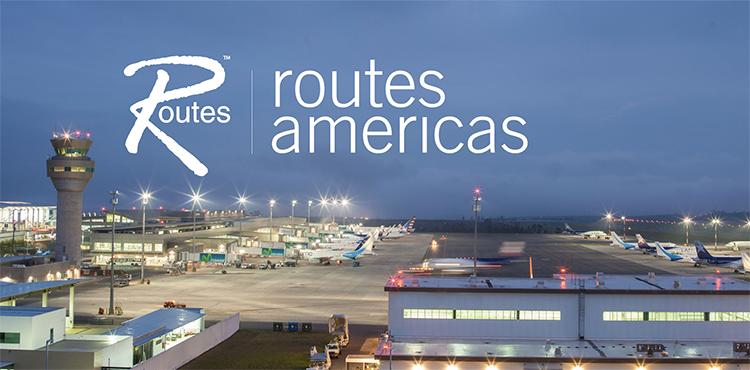
Corporación Quiport, the concessionaire responsible for the general management of the airport, constantly promotes joint work strategies with domestic and international airlines to increase connectivity. This makes Quito International Airport an attractive and safe place for operations, with high levels of service.
Corporación Quiport works non-stop to develop connectivity. This year at the Routes Americas 2020 held in Indianapolis, USA, Quiport’s Route Development team met with 22 airlines and airports to discuss and seek partnerships to bring new airlines to the Ecuadorian market and increase destinations and frequencies.
Mariscal Sucre International Airport is the main gateway that connects the city and Ecuador to the world. For several years, Corporación Quiport has implemented a route development strategy to attract more airlines to the country, under the premise that airlines are not just customers and users of the airport but are strategic partners for the growth of connectivity.
Quiport works with these companies on a continuous basis through direct conversations to attract new airlines to Quito and develop new routes or increase capacity and frequencies on existing routes. It is also responsible for creating a positive ecosystem so that airlines can operate successfully at the airport.
Andrew O’Brian, President and CEO of Corporación Quiport, explains that participating in Routes Americas has special importance as it is the basis for the entire strategy to increase connectivity at Mariscal Sucre Airport. “Participating in Routes Americas allows us to follow up on conversations and negotiations with various airlines, but it is also an ideal opportunity to propose new direct flights and present airlines with studies and figures on their potential. During our meetings with the airports, we establish joint strategies and incentive packages for the airlines we want to open routes with”. He adds that 2019 was a year of record growth in connectivity at Quito Airport since it opened in 2013.
Quiport understands that the development of a new route and increases in frequencies and capacity require the airline to invest significant resources and to take on risks. With a flexible policy, the concessionaire seeks to share part of the risk of route development. This is why it works together with the Municipality of Quito and the central government, in conjunction with airlines, to develop incentive plans tailored to the needs of each airline.
Thanks to the work strategies with the airlines, today Quito International Airport is highly valued for creating a collaborative ecosystem which facilitates the development of airline operations. This is designed to serve both new companies starting up operations and those already operating in the city.
QUITO AIRPORT’S RESPONSE TO THE INTERNATIONAL EMERGENCY OVER THE NEW CORONAVIRUS
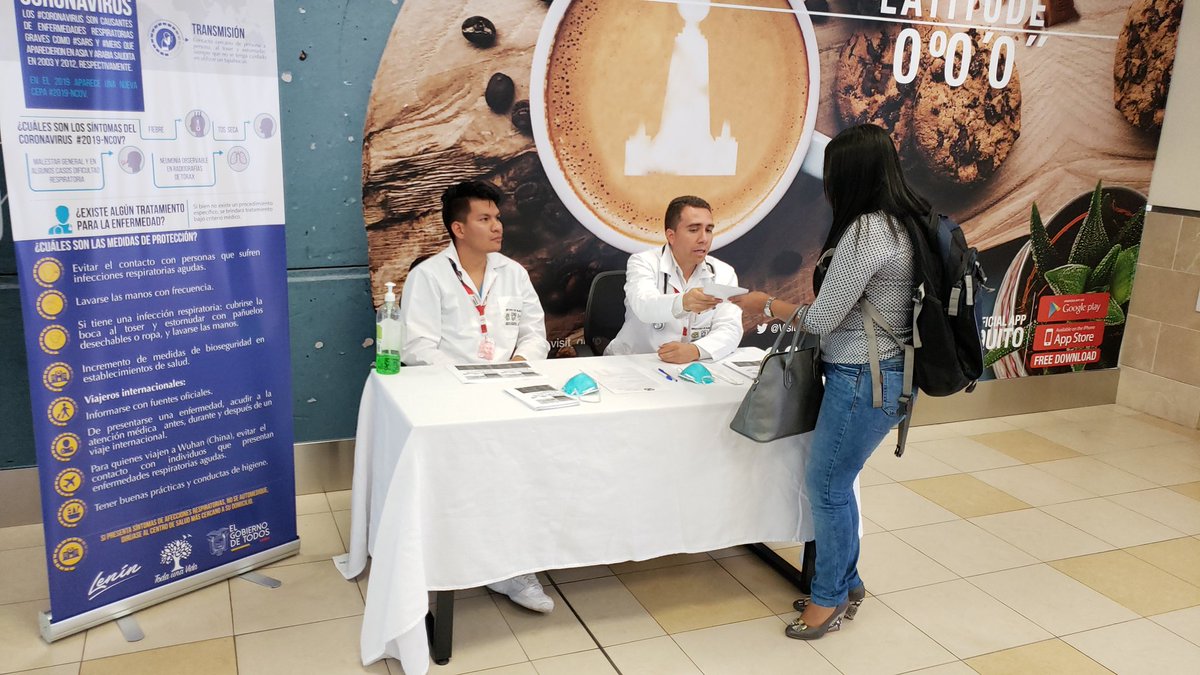
Yesterday, January 30, the World Health Organization (WHO) declared the outbreak of novel coronavirus (2019-nCoV) in China a public health emergency of international concern.
Corporación Quiport, concessionaire of the Quito airport service, is continuously providing every facility to apply the information and control protocols set in place by the Ministry of Public Health in Ecuador (MPH), following WHO guidelines. Currently, the Ministry has six information and prevention points plus 18 health professionals and is providing information in various areas and on screens at the passenger terminal of Quito International Airport. The Municipality of Quito has set up two additional information points in the terminal as well.
The epidemiological surveillance protocol in Ecuador – enforced by the Health Ministry in compliance with international health measures – includes active surveillance, early detection, isolation, case management, contact tracing and prevention of infection by 2019-nCoV.
As an additional measure, in coordination with the Municipality of Quito through Empresa Pública Metropolitana de Servicios Aeroportuarios, Quiport is implementing a plan to disinfect areas frequented by passengers in the terminal. This includes international arrivals (boarding bridges, stairs, handrails, elevators, bathrooms, baggage carousels, immigration counters, customs), international departures (security screening, transit, immigration counters). Virkom, a hospital-use broad spectrum virucidal disinfectant is used.
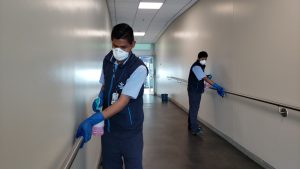
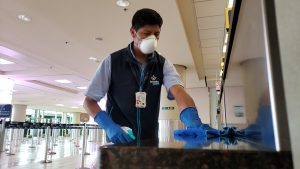

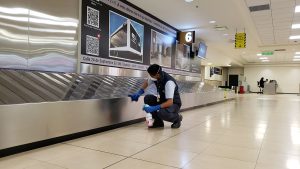
Sandro Ruiz, General Manager of Empresa Pública Metropolitana de Servicios Aeroportuarios says “we are ready to respond to citizens’ calls for information and are working together with the Ministry of Health and Quiport. Mariscal Sucre Airport has taken the good initiative to safeguard the wellbeing of passengers with this continuous disinfection, an action which is in addition to keeping citizens informed in this regard.”
Andrew O’Brian, President and CEO of Quiport, explains that the airport is providing all its support to the country and city to implement prevention measures in the face of this outbreak. “It is important that passengers who arrive at our airport receive all the necessary information about the disease and see the presence of the State in prevention activities. On our part, the operation to disinfect the terminal is an additional measure to safeguard the health of passengers and airport employees”.
In coordination with all operators, employees who work at Quito International Airport observe health and hygiene measures such as constantly washing hands and using disinfectant gel to prevent respiratory infections, and seeking immediate medical attention if symptoms occur.
The authorities have called on citizens to remain calm and only obtain information from official sources. There is constant communication between the airport community, led by Corporación Quiport, and the civil aviation and public health authorities.
2019, A RECORD YEAR FOR CONNECTIVITY AND ENHANCED SERVICES AT QUITO MARISCAL SUCRE AIRPORT
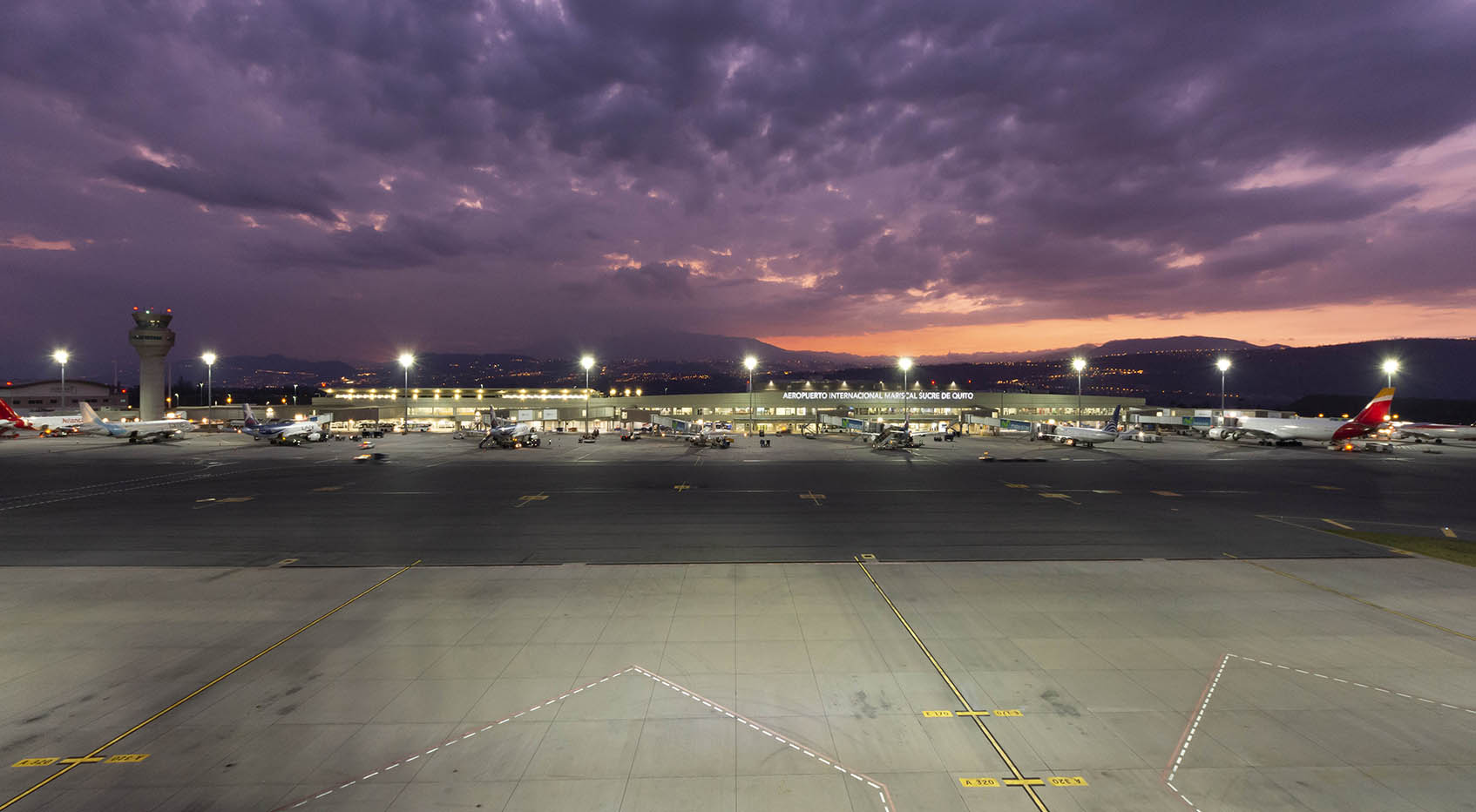
- Increased connectivity with the world, launch of new routes and new domestic and international airlines.
- Expansion of the passenger terminal building with a US$ 60 million investment.
- Continued enhancement of user services and execution of social and environmental responsibility projec
Corporación Quiport’s performance in 2019 has had positive results across all areas of work by the company in charge of Quito International Airport. Below we set out our biggest achievements in 2019.
Connectivity
In 2019 four new international airlines were added to Quito Airport’s list of carriers: Air France, Plus Ultra, Air Canada and Interjet, as well as one domestic airline: Aeroregional. We also expanded international routes with the addition of Toronto, Dallas, Paris and Santiago, and domestically we increased flights to Guayaquil, Cuenca, Manta, Coca and Santa Rosa. Quiport works together with the national government and the Municipality of Quito on a route development strategy to promote connectivity in Quito, presenting it as an attractive destination for tourism and business. There is increasing interest from airlines in Quito and Ecuador thanks to tourism campaigns and an open skies policy which demonstrate the country’s willingness to welcome new airlines.
Cargo
In 2019, for the second consecutive year, cargo operations at Quito International Airport were awarded in the Air Cargo Excellence Awards (ACE) the Diamond Award (first place) in the category of airports up to 399,999 tons of cargo per year, Top Cargo Airport in Latin America and top airport for Specialty Cargo worldwide. This is topped off by a new record for cargo for the Valentine’s Day season, with more than 18,000 tons exported.
Infrastructure
Works began on the redesign of the public departures hall and expansion of the passenger terminal building, the results of which will no doubt provide a positive experience to users.
The works in the public hall, which began in July, aim to enhance the comfort of passengers by optimizing spaces and the flow in the airport. The space will be given a new design to celebrate the context of the airport and the city: a warm natural land full of life with a unique culture and friendly people. An investment of US$ 21 million has been made in the redesign of the departures and arrivals hall, which will be delivered in 2020.
On November 18, 2019, works began to expand the passenger terminal building. With an investment of US$ 60 million,this building will have an area of 16,000 m2. Once the works are completed the terminal will see a 35% increase in areas such as the departure lounges, public departures and arrivals hall, immigration area, customs, and baggage reclaim area.
The space will have a highly functional design and decor to highlight the airport’s identification with the city and its surroundings. This will be achieved with materials and colors such as blue tones in the carpets to recreate the skies of Quito, wood, granite and green spaces.
Passenger Service
To provide a positive experience to users and passengers, new water bottle refill and drinking fountains in the departure lounges and the departures and arrivals hall. This aims to reduce the use of plastic bottles. The water fountains provide 100% purified water. Additionally, we have renovated and increased the number of self-service check-in kiosks which also allow passengers to print labels for checked baggage.
The Domestic VIP Lounge was refurbished with modern decor and designed to enhance the comfort of passengers and increase capacity. The International VIP Lounge was the Global Winner of the Priority Pass Lounge of the Year Awards.
Passengers who travel with pets have the convenience of pet relief areas equipped with hydro-sanitary systems, artificial turf, disposable bags and trash cans. These areas are found in the domestic and international departure lounges and the sidewalk by domestic arrivals.
Social and Environmental Responsibility
It is essential to carry out the airport’s activities within a sustainable, environmentally friendly framework which is responsible towards the community. For this reason, 11 social responsibility programs are carried out for the benefit of more than 45,000 people.
In 2015, the airport joined the Airport Carbon Accreditation (ACA) Program and in 2019 it completed the four stages of the program with concrete actions to reduce greenhouse gas emissions, save fuel, increase energy efficiency and appropriate water use, and protect conservation areas for flora and fauna. The result: Mariscal Sucre Airport became the first international airport in Latin America to obtain carbon neutral status. Also, in 2019 the airport subscribed to the United Nations Global Compact.
Awards
Quiport’s work at Quito International Airport has been recognized by an array of industry stakeholders. In March, Skytrax awarded the airport the Best Regional Airport in South America for the fourth time and Best Airport Staff in South America for the third time as well as renewing its Four-Star Airport status. For the sixth consecutive year, the airport was named South America’s Leading Airport at the World Travel Awards and was ranked 12th in the best airport rankings worldwide by AirHelp, an international organization which advocates for air passenger rights around the world.
The airport’s cargo terminal was awarded the top Diamond status in the category of 399,999 tonnes of cargo per year, as well as the Top Airport in Latin America and Top Airport – Speciality Cargo by Air Cargo Excellence.
In short, 2019 was a highly positive year for airport development in Quito. The results reflect the joint work with the national government, Municipality of Quito and the airport community to increase efforts and find opportunities for improvement to contribute to the progress of the city and country.
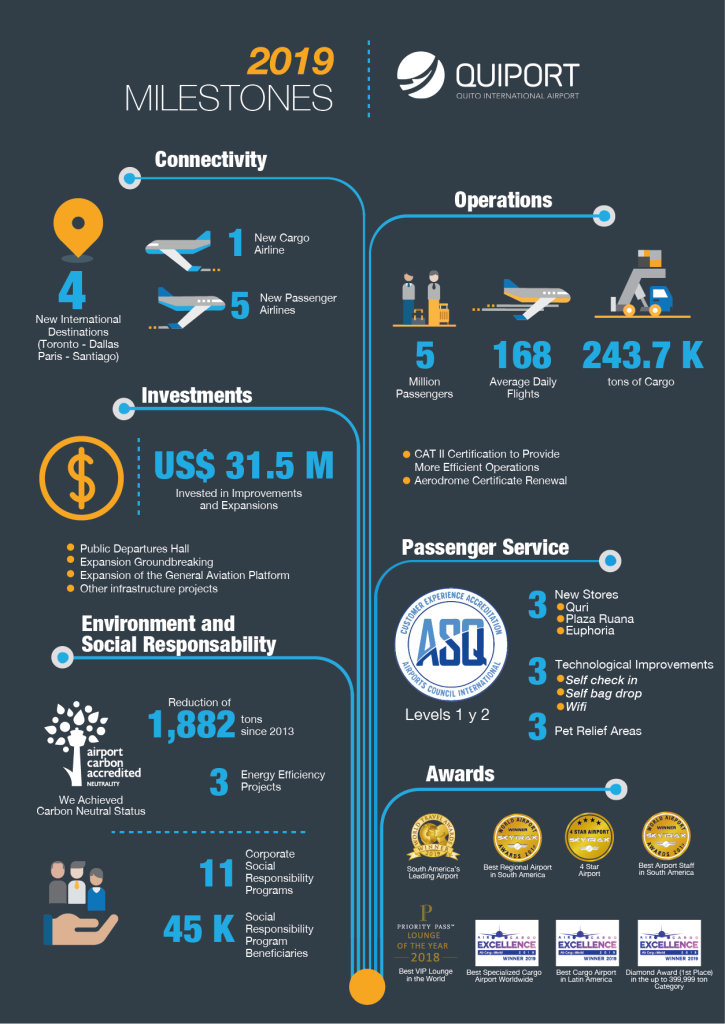
MARISCAL SUCRE AIRPORT ENDS A GREAT YEAR FOR CONNECTIVITY WITH THE INAUGURAL FLIGHT ON THE DALLAS FORT WORTH – QUITO ROUTE
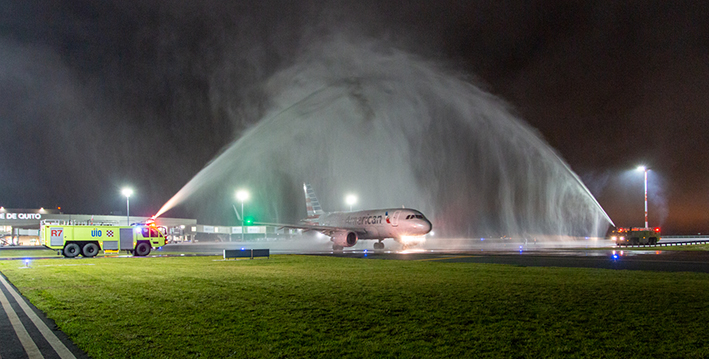
- Starting from December 18, American Airlines will offer a new route served by an Airbus 319.
American Airlines will fly from Mariscal Sucre Airport to Dallas Fort Worth (DFW) with seven weekly frequencies served by Airbus 319 aircraft. This increases the range of destinations to Europe and Asia, in addition to the 900 domestic destinations served by connections within the United States.
“With this new route between Quito and Dallas, we have increased our capacity by 50%, strengthening our nearly 30-year commitment with the country”, says Edwin Rincon, Commercial Manager at American Airlines in Ecuador. “From DFW we offer countless connections, guaranteeing a greater flow of tourists to Ecuador and also connecting the country and our Ecuadorian customers to a vast number of destinations in Asia, Europe and around the USA”.
“Tonight, we as Ecuadorians are particularly pleased that American Airlines is expanding its services with daily direct flights from Dallas to Quito and Guayaquil. This confirms its confidence in Ecuador and facilitates the arrival of more tourists from our priority market, the USA, and from the rest of the world” confirms Rosi Prado de Holguín, Minister of Tourism.
For Quiport, concessionaire of the airport service, expanding destinations which will represent further growth, help to develop air connectivity and encourage tourism is one of its main objectives as part of its strategic goals. Andrew O’Brian, President and CEO of Corporación Quiport, says “our joint work with the Ministry of Tourism and the Municipality of Quito has been very intense, and as a result we have achieved a record year for connectivity. Today, Quito and Ecuador are more connected than ever to the world”.
“It has been a successful year for the airport’s connectivity processes. It is good news for the city, and the Municipality of Quito through Empresa Pública Metropolitana de Servicios Aeroportuarios welcomes this flight with open arms” says Sandro Ruiz, General Manager of Empresa Pública Metropolitana de Servicios Aeroportuarios.
